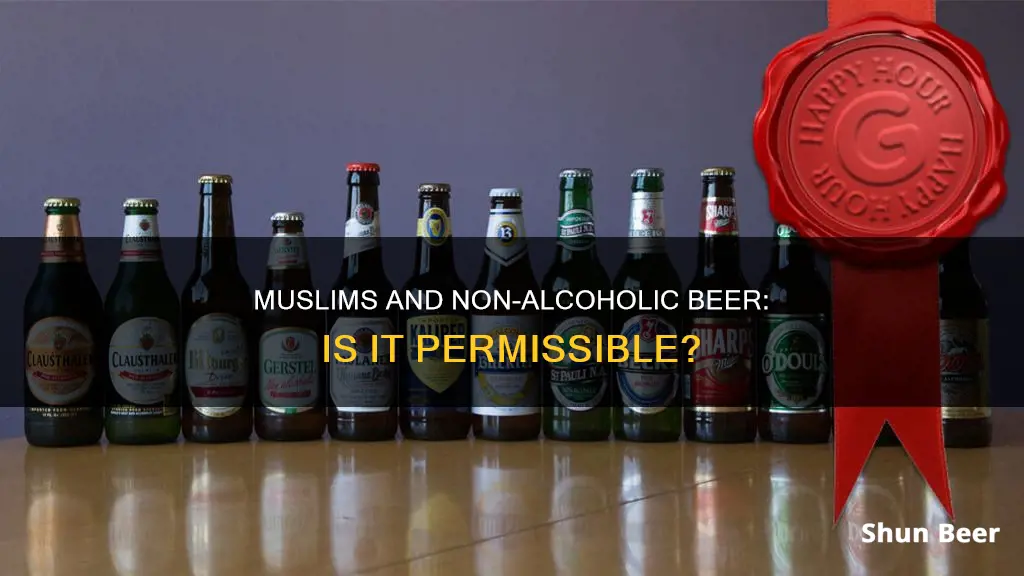
The consumption of non-alcoholic beer by Muslims is a highly debated topic. While some Islamic scholars argue that non-alcoholic beer is permissible (halal) as long as it contains a negligible amount of alcohol that is non-intoxicating, others suggest avoiding it entirely. The key reason alcohol is prohibited for Muslims is due to its intoxicating effects, which impair judgment and self-control. The majority of non-alcoholic beers contain a small percentage of alcohol, typically less than 0.5% ABV, which is comparable to the amount found in some fermented foods. Some scholars argue that since this trace amount of alcohol is too low to cause intoxication, non-alcoholic beer does not fall under the same category as regular beer. However, more conservative scholars stress that even the smallest amount of alcohol should be avoided to steer clear of any gray areas. Additionally, non-alcoholic beer might still retain the visual appearance and associations of regular beer, which can lead to confusion or imitation of sinful behavior. Ultimately, the decision lies in an individual's conscience and their interpretation of Islamic principles.
What You'll Learn

The Trace Alcohol Argument
Proponents of the argument's permissibility emphasise that the key reason alcohol is prohibited in Islam is due to its intoxicating effects, which are absent in non-alcoholic beers. They liken the presence of trace alcohol in these beverages to that found in many everyday products like medicine, vinegar, bread, and even ripe fruit. Citing the concept of "Umum al-Balwa", they argue that unavoidable minor impurities are acceptable in daily life. As long as the alcohol content is minimal and does not lead to intoxication, some scholars suggest that such traces are permissible.
On the other hand, more conservative scholars and schools of thought advocate for a strict avoidance of any amount of alcohol, regardless of its intoxicating effects. They argue that the presence of even a minuscule amount of alcohol is enough to make a substance haram. This stance is based on the principle of "Ihtiyat" (precaution), which encourages Muslims to steer clear of any potential doubts about the permissibility of a substance. Additionally, they contend that non-alcoholic beer still retains the appearance and associations of regular beer, which can lead to confusion and imitation of sinful behaviour.
Mormons and Root Beer: What's the Deal?
You may want to see also

Avoidance of Doubt
There are differing opinions among Islamic scholars on whether Muslims can drink non-alcoholic beer. While some argue that it is permissible (halal) as long as it contains a negligible amount of alcohol that is non-intoxicating, others suggest avoiding it entirely. Here is an exploration of the "Avoidance of Doubt" perspective:
Some Islamic scholars and schools of thought advocate for a more conservative approach, emphasizing the principle of "Ihtiyat" (precaution). They argue that even the smallest amount of alcohol, regardless of its effects, should be avoided to steer clear of any gray areas. This perspective is based on the belief that if there is any doubt about the permissibility of a substance, it is better to err on the side of caution and refrain from consuming it.
The Prophet Muhammad (PBUH) advised believers to "Leave that which makes you doubt for that which does not make you doubt" (Sunan al-Tirmidhi 2518). This guidance encourages Muslims to avoid anything that creates suspicion or uncertainty. In the context of non-alcoholic beer, there are a few considerations that fall under this category:
- Visual Appearance and Associations: Non-alcoholic beer may still resemble its alcoholic counterpart in terms of packaging and branding. This similarity can lead to confusion, especially for those who are not aware of the difference. It may also associate the drink with the drinking culture, which is generally considered non-Islamic.
- Potential Presence of Alcohol: While non-alcoholic beers are produced to have minimal or no alcohol content, there is always a possibility of trace amounts of alcohol being present. The Islamic Religious Council of Singapore states that non-alcoholic beers are haram because the process of making them is the same as that of alcoholic beers, and it is rare to remove 100% of the alcohol. They argue that if the whole of something is haram, then a part of it is also haram.
- Intention (Niyyah): Although intention plays a role in the permissibility of an action, it can be challenging to determine an individual's intention for consuming non-alcoholic beer. Some scholars argue that if the intention is to imitate sinful behavior or to experience the effects of intoxication, it is better to avoid such substances altogether.
Ultimately, the decision to consume non-alcoholic beer lies with the individual's conscience and their interpretation of Islamic principles. Those who subscribe to the "Avoidance of Doubt" perspective choose to refrain from non-alcoholic beer to align with their understanding of Islamic teachings and to avoid any potential uncertainties or gray areas.
Butter Beer: Can You Legally Name a Drink This?
You may want to see also

The Role of Intention
The consumption of non-alcoholic beer among Muslims is a highly debated topic, with various factors influencing its permissibility. One crucial aspect is the role of intention, which holds significant weight in the Islamic faith.
Niyyah, or intention, plays a pivotal role in determining the permissibility of consuming non-alcoholic beer for Muslims. The intention behind the consumption of such beverages is a key differentiator for many Islamic scholars. Some scholars argue that if an individual's intention is to avoid intoxication and merely enjoy the flavour of the drink, it could be viewed as permissible. In this context, intention takes precedence, and the drink may be considered halal as long as it is not consumed to induce intoxication or mimic prohibited actions associated with alcoholic beverages.
However, it is important to note that intention alone may not satisfy more stringent scholars, who advocate for caution and avoidance. They emphasize that the intention to avoid intoxication does not outweigh the fact that non-alcoholic beer still resembles something considered haram. This perspective aligns with the principle of "blocking the doors to transgression" in Islamic jurisprudence, which encourages Muslims to steer clear of any potential doubts or gray areas.
Additionally, the production process of non-alcoholic beer is also a factor in the debate. Some scholars argue that since non-alcoholic and alcoholic beers are produced similarly, with alcohol later extracted, the former is still considered impure. This view is based on the Islamic principle that if a whole thing is haram, then any part of it is also haram.
The debate surrounding the role of intention in consuming non-alcoholic beer among Muslims highlights the diversity of opinions among Islamic scholars. While some emphasize the importance of intention and the absence of intoxication, others prioritize the avoidance of doubt and the preservation of Islamic culture and values. Ultimately, the decision lies with the individual's conscience and their interpretation of Islamic principles.
Detox and Drinking: Is Having a Beer Safe?
You may want to see also

Non-alcoholic beer production process
The production of non-alcoholic beer has evolved dramatically since the early 20th century, when it was first demanded. The aim is to create a beverage that tastes like its alcoholic equivalent, without the alcohol content.
Non-alcoholic beer can be produced by restricting alcohol formation during fermentation, using special yeast strains that do not produce alcohol, or through thermal or membrane removal of alcohol.
Restricting Alcohol Formation During Fermentation
This method involves interrupting or stopping fermentation before all the alcohol is formed. This can be done by using yeasts that only partially ferment the wort, and then removing the yeasts to stop the process. This avoids the need for dealcoholisation, but the resulting product often has a stronger wort-like flavour and is lacking in aroma compounds.
Using Special Yeast Strains
Special yeast strains can be used that have a greater affinity for specific parts of the wort, or that produce less alcohol. For example, Saccharomyces rouxii spp. is considered a low alcohol-producing yeast due to its inefficiency in degrading maltose, the most abundant sugar in the wort.
Thermal Removal of Alcohol
Thermal processes generally alter the sensory properties of the final product, reducing aroma, body, carbonation, and flavour, and intensifying undesirable aromas. Examples include vacuum evaporation, vacuum distillation, and centrifugation distillation.
Membrane Removal of Alcohol
Membrane separation processes have the advantage of operating at mild temperatures, with low energy consumption, and without the need for chemical additives. Examples include nanofiltration, reverse osmosis, osmotic distillation, dialysis, and pervaporation.
Other Techniques
In recent years, brewers have become more creative in removing alcohol. One popular technique is reverse osmosis, which pushes the beer through a filter with holes small enough that only water, alcohol, and a few volatile acids can pass through. The alcohol can then be separated from the water through standard distillation, and the remaining water and acids are returned to the syrup of sugar and flavours.
Carbonation
Non-alcoholic beers differ from alcoholic beers in that they do not become carbonated through fermentation in the bottle. Instead, the brewer will usually inject carbon dioxide into the bottle, keg, or can.
Clearwater Beach: Beer Drinking Rules and Regulations
You may want to see also

Islamic jurisprudence
The consumption of non-alcoholic beer by Muslims is a highly debated topic in Islamic jurisprudence, with various arguments and counter-arguments presented by scholars and adherents alike. The discussion revolves around the interpretation of Islamic principles and the specific characteristics of non-alcoholic beer.
At the heart of the matter lies the Islamic prohibition of intoxicants, as outlined in the Quran and Hadith. Surah Al-Ma'idah (5:90) states, "O you who have believed, indeed, intoxicants, gambling, [sacrificing on] stone alters [to other than Allah], and divining arrows are but defilement from the work of Satan, so avoid it that you may be successful." This verse clearly establishes the impurity and harmful nature of intoxicants, which are deemed haram. The key criterion for determining the permissibility of non-alcoholic beer, therefore, becomes its potential to cause intoxication.
Non-alcoholic beer is produced similarly to regular beer but undergoes additional processes to reduce or eliminate alcohol content. The majority of these beverages contain less than 0.5% alcohol by volume (ABV), which is comparable to the trace amounts of alcohol naturally found in some fermented foods like soy sauce, bread, or ripe fruit. This minimal amount is generally considered non-intoxicating, and some Islamic scholars argue that such products are permissible (halal) as they do not lead to intoxication. They apply the concept of "Umum al-Balwa", which acknowledges minor unavoidable impurities in daily life, including trace amounts of alcohol in various everyday products.
However, there is a counterargument that even the smallest amount of alcohol should be avoided to prevent any ambiguity. This principle, known as "Ihtiyat" (precaution), encourages Muslims to steer clear of substances that may raise doubts about their permissibility. In support of this view, the Islamic Religious Council of Singapore has stated that non-alcoholic beers are haram because they are produced using the same methods as alcoholic beers, and the complete removal of alcohol is never guaranteed. They assert that if the whole of a thing is haram, then a part of it is also haram. Additionally, the culture of beer drinking is considered non-Islamic and haram, and consuming non-alcoholic beer may lead to confusion or imitation of sinful behavior.
The role of intention (Niyyah) is also significant in this discussion. Some scholars argue that if an individual consumes non-alcoholic beer with the intention of avoiding intoxication and merely enjoying the flavor, their intention may render the act permissible. However, for more stringent scholars, the intention alone may not be sufficient, and they emphasize the visual resemblance of non-alcoholic beer to its alcoholic counterpart, which could lead to confusion and imitation.
The debate surrounding non-alcoholic beer in Islamic jurisprudence is nuanced, and different schools of thought offer varying interpretations. Some scholars lean towards permissibility, citing the negligible and non-intoxicating amount of alcohol, while others advocate for avoidance, emphasizing the potential for doubt and the resemblance to haram substances. Ultimately, the decision rests with the individual's conscience and their interpretation of Islamic principles, often guided by local religious scholars or specific schools of thought.
Chickens and Beer: A Safe Combo?
You may want to see also
Frequently asked questions
Some Muslims argue that non-alcoholic beer is haram because it's made by the same companies that make regular beer, and the same machinery is used, which can cause contamination with alcohol. However, others argue that this can be said for many other things, such as buying food from halal restaurants, where there is always a chance of betrayal.
Some Muslims argue that non-alcoholic beer is haram because it's not completely free of alcohol. However, others argue that many other things also contain traces of alcohol, such as bread and fruit, and that a minor amount is not intoxicating, so it's halal.
Some Muslims argue that drinking culture is not Islamic culture, so non-alcoholic beer is haram. However, others argue that culture is generally regional, not religious, and that the main thing is to avoid intoxicants, which non-alcoholic beer does.
Some Muslims argue that non-alcoholic beer might lead to drinking actual alcoholic drinks, so it's better to avoid it altogether. However, others argue that intention matters, and as long as the drink is not consumed for the purpose of intoxication or mimicking prohibited actions, it's permissible.
No, there is no single answer. Different Islamic scholars and schools of thought have differing views. Some argue that non-alcoholic beer is halal as long as it contains a negligible amount of alcohol that is non-intoxicating. Others take a more conservative approach and suggest avoiding non-alcoholic beer entirely, even if it contains a very small amount of alcohol, because it still resembles something that is haram.







